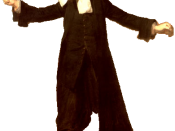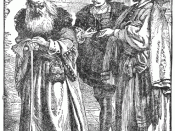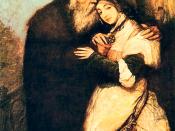It is questionable as to what the Jew, Shylock, can be regarded as - victim or villain? Many factors need to be contemplated when determining if Shylock is to be considered a victim or villain. Having been subject to racism and prejudice, losing his daughter and having been treated harshly by Christians, it is debatable as to whether or not Shylock is a victim or villain. It can be suggested that the Jew may have come to be a villain, from the prejudice that the minority of Venice suffers, but it is very hard to class Shylock as simply a victim or villain for he is a complex character who can be interpreted in many ways.
A Shakespearian audience would have regarded Shylock as a villain, as usury was condemned by the Christian religion in this period, and this means that he was portrayed unsympathetically. The play is a comedy, meaning that no one dies, and that the "good guys" always win and that justice is done to the "bad guys."
Like all comedies there is a villain as: nasty, a law-breaker, a murderer, evil, vengeful, and greedy. Shylock is evil and vengeful, but he does not step outside the law. When he is ready to cut the flesh from Antonio, he is "allowed" to do this due to the bond that he made.
The audience knows that Shylock is a Jew, but all the time, no one recognises any other qualities. The modern audience wouldn't care at all about him, but he does have some good qualities. He works very hard for his money and he is an extremely religious Jew. He can say any quote from the Jewish bible, when talking, and refers to parts of the bible when trying to express something. It is very easy to see Shylock's devotion to his wife, who has already passed away, especially when he talks about the ring she gave him before they were married. He said that he would not give it up for a "wilderness of monkeys", meaning that he would not give it up for all the riches of the world. This really expresses how he is not materialistic and does have a heart. This heart breaks only too fast when his daughter, Jessica, steals the ring. Unlike a typical villain, Shylock does not break the laws, making him a law-abiding citizen. When he wants revenge upon Antonio, it is within the law due to his bond.
Even from this, Shylock still is the villain and he does have some of these typical villain attributes. He is full of revenge, and in court, all he wants to do is kill Antonio. In court, he openly refuses three times the money of what was lent, which would add up to nine thousand ducats. Shylock is very prejudiced against Christians, and this idea arrises when he says this when Antonio asks for the money; " I'll only do this business with you, I won't do this again with you." From this quote it is very easy to see the fact that Shylock is very unhappy about working with a Christian. He is very sly and tricky as he already has his bond set up were Antonio unable to repay. Also, Shylock was a very isolated man and very unsociable.
With all this mentioned, audience from Shakespeare's time would not even care to look at Shylock's positive qualities, because he did not live like a good gentlemen, but modern audiences would feel pity for how he is spat on and abused. A good example of some of the abuse is when Antonio says, "I am likely to kick you again!"When the court scene begins, Shylock is not around, along with Antonio, his 'victim.' The duke, being the master of ceremonies, has the ability to make this harder for Shylock, because he is a good friend of Antonio. This means that the man who controls Antonio's fate is biased towards him, meaning he is in favour of him. A courtroom is meant to be a place where justice is served, and the duke should respect that and not think to be biased. In his absence, they all abuse Shylock and call him many things and consider him extremely inferior. Also in court everyone seems to refer to him as "The Jew." He is portrayed through their stone cold language as a stone cold villain.
After a lot of criticism and abuse, Shylock enters and it is obvious that he wants to speed up things and get down to business, which in this case is killing Antonio. For the court case, Shylock comes in with three necessary items: a knife, kill Antonio, a set of scales to weigh the flesh, and his bond which he is so proud of and shows that what he can legally do and how he abides by the law at all times. The important part of this scene is two of the speeches. The Duke says to Shylock, "We expect you to be filled with pity and passion, please show some mercy." We can see that the Duke is doing his best to persuade Shylock to re-consider and make him think about his future actions, how they are not the right things to do. Shylock replies only to say that he will not show mercy to Antonio and will have revenge upon him for disrespecting Shylock's authority. This answer reinforces that fact that Shylock is a cold-hearted scoundrel.
When the two "women" enter the courtroom, they bring a message saying that the doctor Bellario had been replaced by Balthasar (Portia). Portia starts her case with a plea of mercy, and she begs Shylock to forfeit the bond and accept three times the money. Of course Shylock refuses and demands his revenge upon Christians that have criticised him for being a Jew. Again, this shows his cold side. Portia suggests that he have a surgeon by his side, to heal Antonio's wounds if he bleeds to death. When Portia reads the bond she discovers that Shylock is only allowed to take one pound of flesh. She tells him that he can take his pound of flesh but it must be exactly one pound. Also, Shylock is only allowed to take flesh and no blood can be shed. It is impossible to cut somebody's flesh and have no blood spillages, and it is also impossible to cut exactly one pound of flesh. Of course Shylock will either go above or below the limit. In the end, Shylock is forced to forfeit the bond, because if he went outside the conditions then he too will be punished. Since Shylock forfeited the bond, but attempted murder on an innocent man, Shylock was forced to give up half his money, half to Antonio and half to the general state. Antonio feels sorry for the Jew and declines his half of the money and tells the court that Shylock can keep his money, on the condition that he convert to Christianity and leaves all his money to his daughter on his death. The Jew painfully agrees, so now has lost it all.
Shylock started out as a character that literally almost had it all. Money, a stable business, a good daughter, but unfortunately, some reality kicked in at the end. His daughter runs away with a Christian, steals from him, along with that precious ring that Shylock said he would never give away for all the riches of the world. He literally has nothing left, making him a victim of the play.
So, with everything in mind, is Shylock a victim or villain? He is a villain in court, especially when he's desperately holding his knife to Antonio, although this villainy was caused by prejudice from Christians in the first place. Also, an audience in Shakespeare's time always hated Jews, so it was normal for him to be considered a villain by them. It seems that Shylock is victimised a lot more than what he does to be a villain, and this shows how he is a victim. So I think that Shakespeare wants Shylock to be a villain, but make him look like both-victim and villain.






